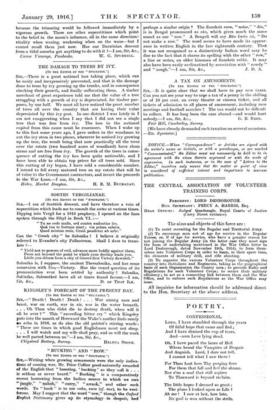"BUCKING " AND " ROW."
[To THE EDITOR OF THE " SPECTATOR.1 Sra,—Writing when growing-armaments were the only indica- tions of coming war, Mr. Price Collier good-naturedly recorded of the English that " boasting, bucking ' as they call it . . . is seldom or never heard." " Bucking " is a comparatively recent borrowing from the Indian source to which we owe " jungle," "nabob," " curry," " arrack," and other such words. To " buck " is to use vaka, vaca (cf. vox), to- be voci- ferous. May I suggest that the word " row," though the Oxford English Dictionary gives up its etymology • in despair, had perhaps a similar origin ? The Sanskrit rava, " noise," "din," is in Bengal pronounced as rdo, which gives much the same sound as our " row." A Bengali will say .Rdo kario na, " Do not make a row." The word seems to have made its appear- ance in written English in the late eighteenth century. That it was not recognized as a distinctively Indian word may be due to the fact that it shares its spelling with the other " row," a line or series, an older kinsman of Sanskrit rekhd. It may also have been easily acclimatized by association with " rowdy "
and " rough."—I am, Sir, &e., J. D. A.


















































 Previous page
Previous page